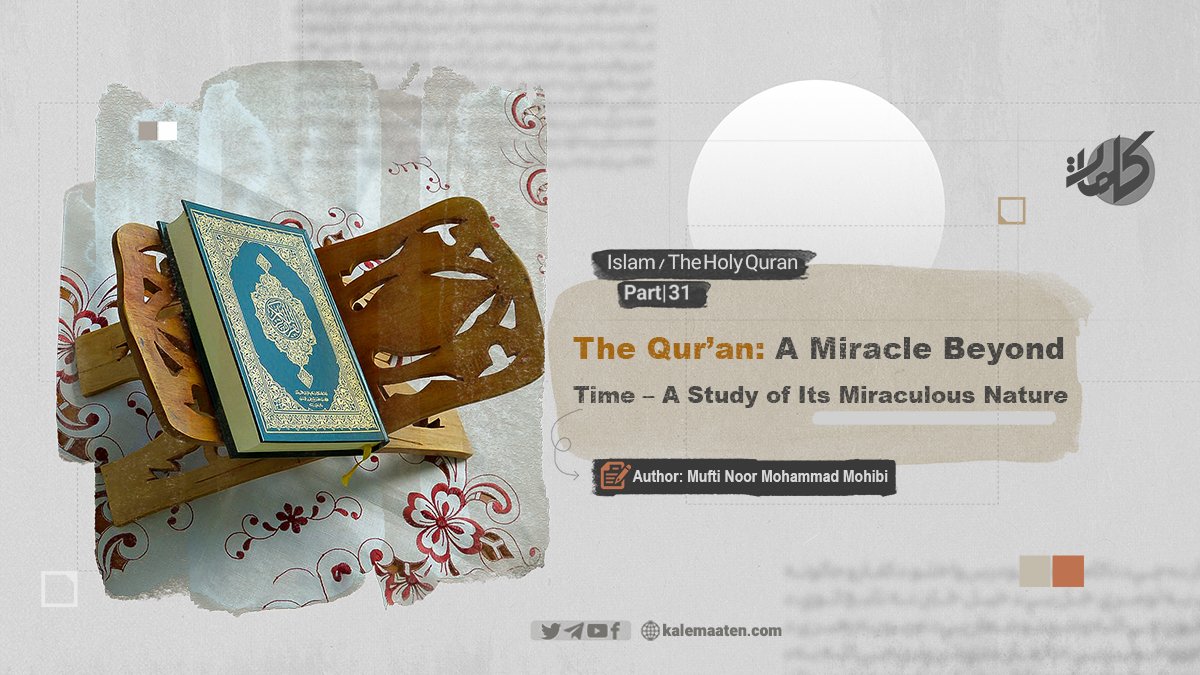
Author: Mufti Noor Mohammad Mohibi
The Quran; A Miracle Beyond Time-A Study of Its Miraculous Nature (Part 31)
Memory: The Treasury of the Secrets of the Human Mind
Allah Almighty says: وَفِيٓ أَنفُسِكُمۡۚ أَفَلَا تُبۡصِرُونَ Translation: “And in yourselves (human beings) are clear signs and certain proofs for the knowledge of Allah and the realization of His power. Do you not see?” [Al-Zariyyat: 21]
Inside humans lies an unknown and deep world. One of the most amazing parts of this inner world is “memory”; a complex, precise and extremely powerful system without which humans would not be able to live, learn or even recognize themselves.
Memory: The axis of recognition and returning
Every human being has a memory in which countless information is stored; from the route to his house to the location of items in the store or house. Without memory, even returning home is not possible.
In the classroom, a student can only answer exam questions with the help of memory, and memory is the treasure that holds knowledge.
Allah says in Surah Yassin: وَلَوۡ نَشَآءُ لَمَسَخۡنَٰهُمۡ عَلَىٰ مَكَانَتِهِمۡ فَمَا ٱسۡتَطَٰعُواْ مُضِيّٗا وَلَا يَرۡجِعُونَ Translation: “And if We will, We can transform them in their places, so they cannot move forward, nor can they return.” [Yassin: 67]
The Amazing Capacity of Memory
Scientific studies show that the human memory can store “more than 60 billion images and information” during a sixty-year life. If we were to put this information on paper, we would need thousands of volumes of books. Despite this vastness, the exact location of this information is still a mystery to human science.
Some new theories believe that memory does not have a fixed location in the brain; rather, it is tied to the “psychological and emotional life of human.”
Classification and location of information
Information that enters the brain is stored at different levels:
Short-term memory: for quick retrieval
Intermediate memory: for semi-permanent information
Long-term memory: for long-term information
Some information: not stored at all
The information that is stored is placed in specific parts of memory based on its type:
Type of information
|
Type of memory
|
Smells and aromas
|
Olfactory memory
|
Images and colors
|
Visual memory
|
Faces
|
Facial memory
|
Names and numbers
|
Nominal and numerical memory
|
Tastes
|
Taste memory
|
Encoding and retrieving information
When we smell a familiar smell, our brain compares it with the stored information using a fast and complex method called “encoding”. If we have smelled dozens of types of perfumes before, our brain quickly finds a similar sample among them and rereads its names.
This encoding exists in all senses: in seeing, hearing, smelling, tasting and touching.
Memory: Dictionary and Simultaneous Translator
Scientists say: “Memory is like a living dictionary that translates in an instant.”
Another surprise is that: the nerve cells responsible for memory neither divide nor die. If these cells are destroyed, all human experiences and knowledge will be destroyed.
Humans’ professional experiences are the result of the gradual storage of information in memory. If memory is destroyed, all those experiences will disappear.
Memory: a mirror of divine greatness
In short, it should be said that “memory” is one of the greatest signs of Allah’s power. Without memory, man not only loses the ability to recognize, learn and think, but his identity also collapses.
This part of the brain is a hidden treasure that is constantly at our service; in sleep and wakefulness, in work and learning, in feeling and cognition. [1]
Continues…
References:
- Encyclopedia of Scientific Miracles in the Qur’an and Sunnah, p. 1, pp. 124-125.



